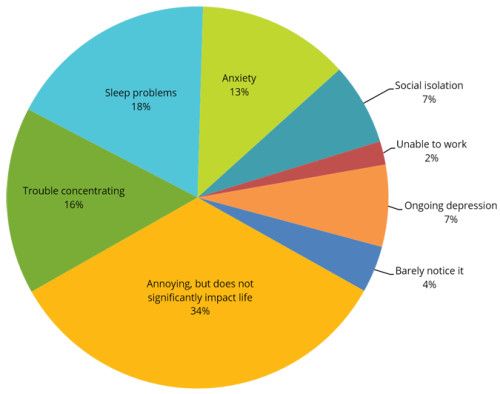Tinnitus Symptoms and Treatment
For those struggling with hearing-related issues such as tinnitus and want to learn more, we're here to help.
Identifying Tinnitus
Tinnitus is defined as a ringing or buzzing in the ears. These sounds vary and are often described as clicking, buzzing, roaring, ringing or hissing sounds. There are several ways tinnitus is identified and categorized.
- Limited tinnitus – By far the most common, is a short-term experience often lasting from over five minutes to several days. This type of tinnitus could be a warning sign that some level of hearing loss is likely occurring.
- Objective tinnitus – This is the only form that can be perceived by others and needs to be seen immediately by a medical professional. Objective tinnitus is a sign of potentially serious problems with your inner ear or other health issues.
- Subjective tinnitus – If your tinnitus can only be heard by you, it’s subjective tinnitus. While the sound level is different for everyone, the treatments and management techniques can be adapted to suit almost everyone.
- Somatic tinnitus – This form is typically related to physical movement or touch. Some have found neck pain to trigger their tinnitus; others experience tinnitus symptoms generated by muscle spasms in their face, head, tongue, arms, trunk, and temporomandibular joint (TMJ) as well.
Part of the difficulty in treating tinnitus lies in the ability of the hearing care professional to understand the individual’s perception of tinnitus.
What Does Tinnitus Sound Like?
Tinnitus can be expressed as a variety of different sounds, but typically fall into one of these three categories:
- Pulsatile – Sounds are perceived to come in pulsing waves that often beat in time with the individual’s heartbeat.
- Tonal – Tonal perception is experienced as near-continuous sound with defined frequencies. These frequencies can overlap but remain distinct and clear in their expression.
- Musical – Rarest of the tinnitus perceptions, an individual can perceive tinnitus as looping music or singing. Often, the musical tune remains the same.
It’s important to note that instead of hearing a single type of disruptive frequency, some tinnitus sufferers may hear both a buzzing and a screeching sound or other sound combinations. If you are interested in hearing tinnitus sample sounds, the American Tinnitus Association has compiled a variety of tinnitus sounds.
What Can Cause Tinnitus?
Along with certain demographics (those who work around loud equipment, earbud users, smokers, musicians, and seniors), there are other triggers that can cause tinnitus.
- Earwax buildup – As earwax builds up, it can cause sound distortion, temporary hearing loss, and could trigger tinnitus symptoms.
- Diabetes – Blood sugar spikes associated with poorly managed diabetes can damage the nerves in the body. The auditory nerve is vulnerable to this form of nerve damage and can trigger hearing loss and tinnitus.
- Loud noise exposure – Long-term loud noise exposure is often one of the most common causes of tinnitus. Even short-term exposure can trigger an episode of temporary tinnitus.
- Neck or head injuries – There are many nerves located in an individual’s neck and head as well as the delicate hearing bones and hairs found in the inner ear. An injury to either of the neck or head can cause a disruption in the person’s hearing and cause tinnitus symptoms.
- Medication – A surprising variety of medications have been identified as ototoxic, which means these medications can damage an individual’s hearing and trigger tinnitus symptoms.
- Stress and anxiety - Patients under high amounts of stress typically report worsening tinnitus systems. Anxiety and anxiety disorders can also exacerbate the condition.
- Smoking and alcohol consumption - Certain lifestyle behaviors can cause ringing in the ears. For those with chronic tinnitus, cessation or reduction of nicotine and alcohol are typically recommended.
Impact Of Tinnitus
Tinnitus can have a serious impact on the day-to-day lives of those who have to live with it. But, depending on the level the individual perceives tinnitus, the impact tinnitus has on their lives can be quite severe. For a fraction of these individuals, tinnitus can be exceedingly bothersome and may even cause negative effects on quality of life, among them disruptions in sleep cycles, anxiety, irritability, concentration difficulties, depression, impact at work, or social isolation.

Although the vast majority of patients with tinnitus are not impacted severely, it still is important to discuss possible management strategies with your hearing health care professional that has training in tinnitus care.
As the world of health care continues to change and develop, health care providers are looking towards ways to emphasize improving the quality of life.
Ways Ebia Hearing & Sound Can Help
While there is no cure for tinnitus, our Audiologist or Hearing Aid Specialist can still offer tinnitus sufferers assistance in managing their symptoms.
- Hearing consultation – Our hearing specialist will spend time consulting with you concerning your experience with tinnitus, and tailor recommendations to your specific needs.
- Comprehensive hearing exam – There are several stages to our hearing exam, from the otoscopy to the speech test. With our comprehensive exam, your precise level of hearing loss and tinnitus can be treated.
- Hearing aids – We have a wide assortment of hearing aids and are up-to-date on the latest hearing technology and tinnitus treatment options. While hearing aids don't cure tinnitus, certain devices can help to limit the symptoms.
- We'll work with you to find the perfect combination of technology and techniques to help you manage your tinnitus.
To start managing your tinnitus symptoms, contact us to set up an appointment today!